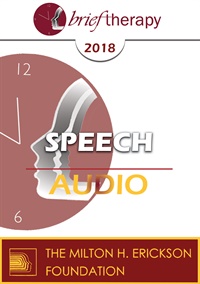BT18 Speech 05 - The Living Legacy of Traumatic Experience - Janina Fisher, PhD
- Average Rating:
- Not yet rated
- Topic Areas:
- Speeches | Trauma
- Categories:
- Brief Therapy Conference | Brief Therapy Conference 2018 | Pioneers in Couples and Family Therapy
- Faculty:
- Janina Fisher, PhD
- Duration:
- 1:05:26
- Format:
- Audio Only
- Original Program Date:
- Dec 09, 2018
- License:
- Never Expires.
Description
Description: Janina Fisher explores how traumatic memories continue to impact individuals through persistent symptoms like depression and anxiety. She introduces the concept of implicit memory, explaining how emotional and visceral memories shape current behavior. Fisher offers practical techniques for helping clients understand their trauma responses, emphasizing a transformational approach that focuses on healing and creating new experiences rather than reliving past events.
Syllabus Description: Neuroscience research has established why it is that trauma results in a fragmented narrative along with a ‘living legacy’ of enduring effects. The survival responses that preserve life and integrity under threat do not diminish once safety is obtained. Meant to warn us of impending danger, these easily re-activated survival responses continue to re-evoke the events of long ago decades after they are over. Once baffling and frustrating to treat, the evolution of new neurobiologically-informed treatments offers new, hopeful answers to the aftermath of trauma: the chronic fear of danger, dread of impending doom, loss of hope or energy, the longing for human connection, and self-destructive and addictive behavior.
Educational Objectives:
- Define five common cognitive, affective, and somatic effects of trauma.
- Differentiate spontaneous emotion from trauma-related implicit memories.
- Describe the effects of trauma-related autonomic dysregulation.
*Sessions may be edited for content and to preserve confidentiality*
Credits
Handouts
| Timestamped Transcript (648.1 KB) | 13 Pages | Available after Purchase |
| Ericksonian Learning Snapshot (246.9 KB) | 2 Pages | Available after Purchase |
Faculty

Janina Fisher, PhD Related Seminars and Products
Janina Fisher, PhD is a licensed Clinical Psychologist and Instructor at the Trauma Center, an outpatient clinic and research center founded by Bessel van der Kolk. Known for her expertise as both a therapist and consultant, she is also past president of the New England Society for the Treatment of Trauma and Dissociation, an EMDR International Association Credit Provider, a faculty member of the Sensorimotor Psychotherapy Institute, and a former Instructor, Harvard Medical School. Dr. Fisher has been an invited speaker at the Cape Cod Institute, Harvard Medical School Conference Series, the EMDR International Association Annual Conference, University of Wisconsin, University of Westminster in London, the Psychotraumatology Institute of Europe, and the Esalen Institute. Dr. Fisher lectures and teaches nationally and internationally on topics related to the integration of research and treatment and how to introduce these newer trauma treatment paradigms in traditional therapeutic approaches.


